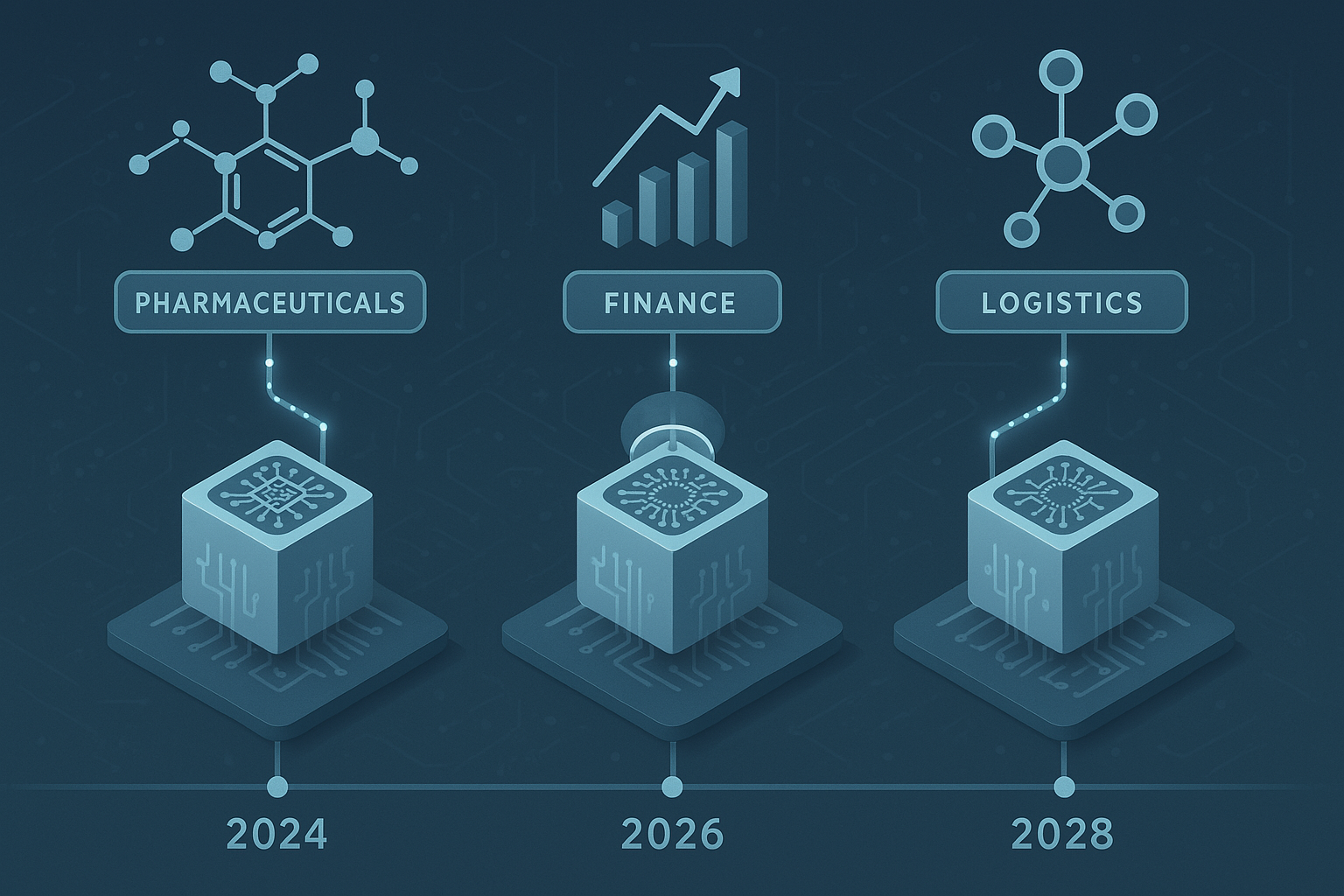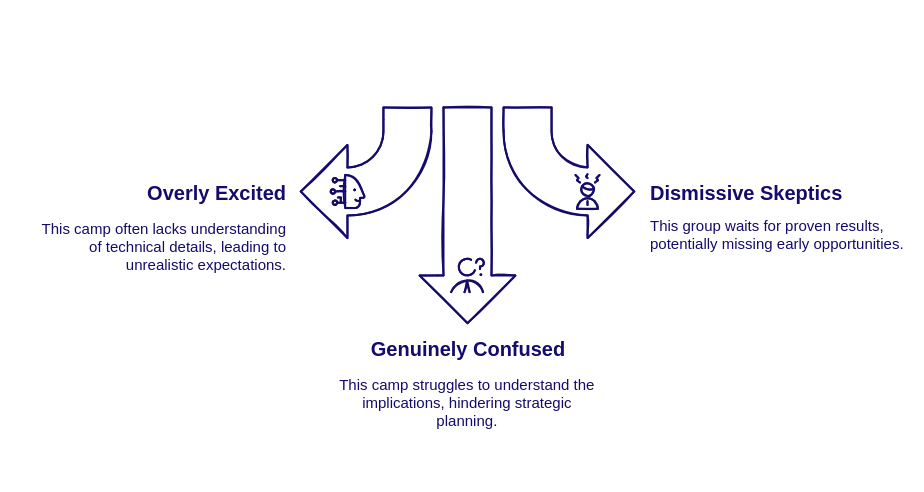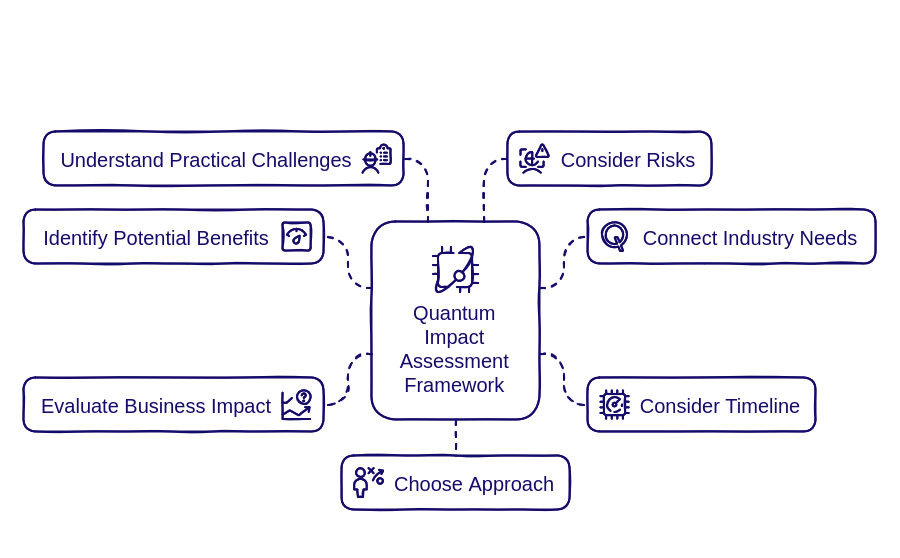
Introduction
In the hype around quantum computing, it’s hard to separate genuine opportunity from science fiction. As someone who’s been tracking this space, I’ve noticed a clear pattern: industries fall into one of three camps – the overly excited (often without understanding the technical details), the dismissive skeptics (“call me when it works”), or the genuinely confused.
What I feel is missing is a straightforward way to think about how quantum computing might actually affect specific industries without getting lost in complex physics or marketing buzz. The below is a framework to help business leaders make sense of the quantum landscape and prepare strategically.

Why This Framework Matters
Quantum computing isn’t just another technology upgrade – it’s a completely different approach to computation. Some industries will be transformed, others will see modest improvements, and some might not feel much impact for decades. A responsive strategy should match a industry’s specific situation.
The Quantum Impact Assessment Framework
Identify Where Quantum Computers Could Help
Start by identifying where quantum computing offers real advantages in your industry. Look for computational challenges that current computers struggle with. Quantum computers are particularly good at solving certain types of problems, like finding optimal solutions among vast possibilities or simulating how molecules behave. Not every difficult problem will benefit from quantum approaches. The pharmaceutical industry offers a good example – designing new drugs requires understanding molecular behavior, which aligns perfectly with what quantum computers could eventually do well.
Connect Industry Needs to Quantum Capabilities
Different industries will benefit from different quantum computing approaches. Some quantum methods are good at breaking complex codes, others excel at searching through massive datasets, and still others help optimize complex systems like supply chains or financial portfolios. Some industries already have quantum computing research underway – financial services companies are exploring how quantum computers could improve risk analysis, while materials scientists are looking at better ways to design new substances. For example, shipping and logistics companies are investigating how quantum computing might create more efficient delivery routes, potentially saving fuel and time.
Consider the Timeline
Quantum computing will develop in stages, and understanding this progression helps with planning. Today’s early quantum computers have limitations but might still offer value in specific areas. Some financial firms are already testing these early systems for certain calculations. More powerful and reliable quantum systems will likely emerge over the next 5-15 years, enabling more comprehensive applications like full-scale drug discovery simulations. Knowing this timeline helps you decide whether to invest now or watch developments from the sidelines.
Evaluate the Potential Business Impact
Putting numbers to the potential benefits makes your quantum strategy concrete. Consider possible efficiency improvements – could quantum computing shorten your product development cycle or reduce operational costs? Think about new possibilities that might open up – could you create products with properties that weren’t previously possible or solve problems that traditional computers simply can’t handle? Also consider how quantum adoption might change competitive dynamics in your industry. Early adopters in pharmaceuticals, for example, might secure valuable patents that reshape market positions.
Understand the Practical Challenges
Identifying implementation hurdles prepares you for real-world adoption. Technical integration is a key concern – how would quantum solutions work with your existing systems? For the foreseeable future, most applications will use both quantum and conventional computing together. Talent is another crucial factor, as quantum computing experts are rare and in high demand. Your organization may also need new ways to prepare data and interpret results, as quantum computing approaches often differ from traditional methods. Being realistic about these challenges helps create achievable implementation plans.
Consider the Risks
Understanding potential downsides ensures a balanced view. Security implications are significant, as quantum computing threatens many current encryption methods. Industries handling sensitive information (healthcare, finance, government) will face major security transitions. Early adopters also risk investing in technology that might quickly become outdated as quantum computing evolves rapidly. New regulations may emerge, particularly around data security. A thorough risk assessment prevents unpleasant surprises down the road.
Choose Your Approach
Based on your analysis, selecting an appropriate strategy becomes clearer. For industries where quantum relevance seems distant, simply keeping an eye on developments might be sufficient. Partnerships with universities or quantum computing companies let you explore specific possibilities without major in-house investment. When your analysis shows promising near-term applications, developing focused test projects makes sense. Industries with clear, near-term benefits should develop comprehensive strategies, including hiring specialized talent, forming partnerships, and planning for infrastructure changes.

Finding Your Industry’s Quantum Path
This framework isn’t about generating excitement or promoting specific quantum technologies. It’s a practical tool to help you assess where quantum computing might genuinely impact your industry, develop an appropriate timeline-based strategy, allocate resources sensibly, and prepare for both risks and benefits. The quantum revolution won’t affect all industries equally or simultaneously. By systematically analyzing your specific situation, you can cut through the noise and develop a measured approach to one of the most significant technological developments on the horizon.
What industry are you in, and how do you see quantum computing affecting it? I’d love to hear your thoughts in the comments.